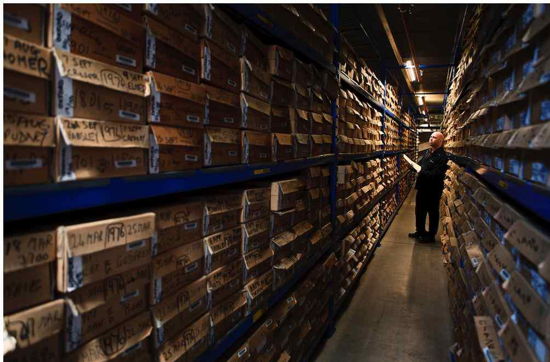41 Million Documents Available Online From UK Government
Project carried out by HM Courts and Tribunals Service and Iron Mountain
This is a Press Release edited by StorageNewsletter.com on January 21, 2015 at 3:18 pmThe UK government’s archive of 41 million wills dates back to 1858 and will enable people to find out more about their family histories, as well as researching the last wishes of some of the most influential people of the 19th and 20th century.
As a result of the project carried out by HM Courts and Tribunals Service (HMCTS) and storage and information management company Iron Mountain, Inc., people will be able to connect to history from the comfort of their own home and look up the wills of people such as:
- The mathematician Alan Turing whose life story has been told in the film The Imitation Game
- Christmas Carol and Oliver Twist author Charles Dickens
- Prime Minister Sir Winston Churchill
- Peter Rabbit creator Beatrix Potter
This project is an example of how the government is opening up public services. It means requests can be dealt with quickly and without people needing to visit the probate registry to search archives in person.
Shailesh Vara, courts minister, said: “This fascinating project provides us with insights into the ordinary and extraordinary people who helped shape this country, and the rest of the world. It is a fantastic resource not only for family historians but also for anyone with an interest in social history or famous figures. I am delighted that HMCTS are leading the way in innovation and are helping deliver a more modern and efficient public service.”
Victorian novelist Charles Dickens, creator of some of the world’s most well-known fictional characters including Christmas favourite Ebenezer Scrooge, left a handwritten will in an attractive cursive script.
The writer George Orwell, who died in 1950, insisted that all his notes, manuscripts, pamphlets, press cuttings and other documents be preserved; while the economist John Keynes, who died in 1946, wanted most of his personal papers and unpublished manuscripts to be destroyed.
Alan Turing, the mathematician and cryptologist who cracked the Enigma code died of cyanide poisoning in 1954 aged just 41. Turing left a brief will sharing his possessions equally among a cherished group of colleagues and his mother.
The creator of Winnie the Pooh, A. A. Milne, who died in 1956, left a share of future royalties and copyright to his favourite London club and Westminster School, while the creator of Peter Rabbit, Beatrix Potter, left a long and generous will that reflected her passion for natural science and conservation.
Phil Greenwood, commercial director, Iron Mountain said: “The completion of this phase of our work with HMCTS marks a significant milestone in a project to help deliver services online. The size of the archive is both humbling and impressive. Every will among the 41 million is a precious historical document that can provide remarkable insight into generations of lives lived and lost. The wills offer us a unique glimpse of individuals in their roles as father or mother, friend or colleague. The online availability of the wills is a welcome opportunity for anyone wishing to add detail to their family history.
“It gives the general public, here and overseas, the chance to get closer to their ancestors. The ease of access enabled by technology is matched by careful preservation of the original paper records. These are and will remain in trust for future generations in a secure, temperature-controlled environment.”
The availability of the database of 41 million wills follows the first stage of opening up the archive when soldiers’ wills were made available in 2013.
Since then there have been more than 2 million searches of the site showing people’s interest in family history. The latest phase in the programme means that people can now request a specific will online and receive an electronic copy within ten working days.
Creating the wills archive is part of ongoing work to transform HMCTS to make it a modern, efficient, digital service which is easy for the public to access.
More than 150 cases have been filmed in the Court of Appeal since the government changed the law to allow court broadcasting in 2013 and £160 million is being invested in digital technology for courtrooms including video links, wifi and improved IT systems to end the system’s reliance on paper.
Members of the public can order scanned copies of the wills for a fee of £10.














 Subscribe to our free daily newsletter
Subscribe to our free daily newsletter

